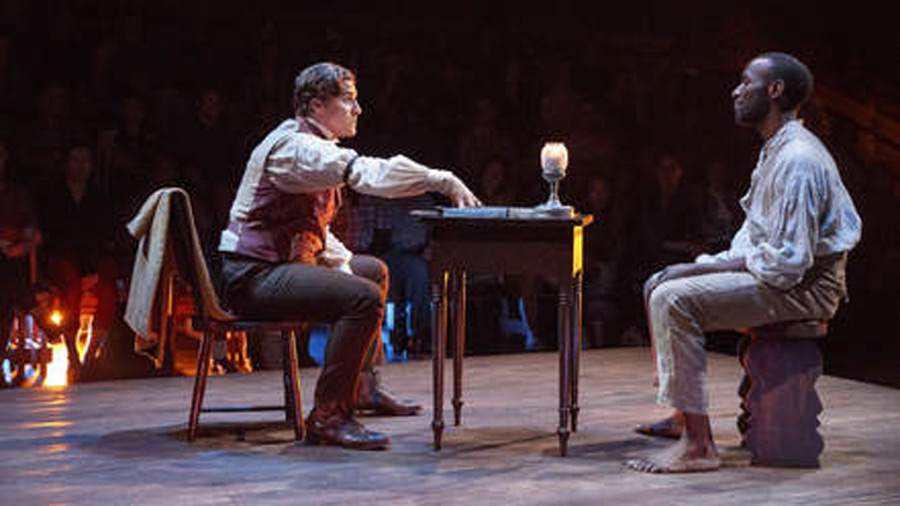As a playwright based in New York City, Nathan Alan Davis’ work provides an honest, powerful, brave and beautiful insight into the black narrative in America. Filled with humanity, humor, and compassion, Nathan’s scripts offer an authentic voice that centers love and hope.

Photo of ’Nat Turner in Jerusalem,’ a play by Nathan Alan Davis. (photo by Joan Marcus)
His multi-award winning plays have been performed in multiple theatres around the United States. These productions include Nat Turner in Jerusalem—which won the Steinberg/ATCA New Play Citation Award; Dontrelle, Who Kissed the Sea—which became an off-Broadway production; The Wind and the Breeze; Original Story; and the soon to be released Refuge Plays, which will make its debut at the McCarter Theatre Centre in 2020. In his interview with Cloud9, Nathan shares what inspires him to write stories rooted in the African diaspora, and why he is moved to contribute to a greater narrative.
Born into an artistic Baha’i family in Illinois, Nathan got his start in theatre as an actor. After completing a Bachelor of Fine Arts at the University of Illinois, Nathan recognized the lack of stories and roles in theatre that reflected the black narrative in America, so he decided to pursue a career as a playwright in order to bring these stories to life. He was soon accepted to the Masters in Fine Arts playwright program at Indiana University, followed by a fellowship at Juilliard. Nathan believes that theatre forms a place where people can find spiritual meaning, truth and purpose. He is inspired by the following words of Abdu’l-Baha:
The drama is of the utmost importance …. It has been a great educational power in the past; it will be so again. – Abdu’l-Baha, Abdu’l-Baha in London, p. 93.
Nathan also shares how the following Baha’i teachings on consultation play a role in his work, and his search for truth through narrative and story-telling:
The members thereof must take counsel together in such wise that no occasion for ill-feeling or discord may arise. This can be attained when every member expresseth with absolute freedom his own opinion and setteth forth his argument. Should anyone oppose, he must on no account feel hurt for not until matters are fully discussed can the right way be revealed. The shining spark of truth cometh forth only after the clash of differing opinions. – Abdu’l-Baha, Selections from the Writings of Abdu’l-Baha, p. 320.
Being a husband and father has meant that Nathan has had to balance the needs of his family with his career, in an industry constantly burdened with financial limitations. Consequently, Nathan has expanded his work into television, most recently writing for a Facebook series called Sorry for your Loss, and also lectures in the theatre department at Princeton University. In his interview with Cloud9, we discuss the role that purpose and service play in his work as a playwright, and how he envisions this evolving in the future.
In his interview with Cloud9, Nathan shares how the Baha’i teachings on racial unity help him find hope and confidence in the future of theatre. We discuss the complexities of identity, particularly as a black person in America, the necessity of confronting this complexity, and the implications of how one perceives themselves. In his interview, Nathan admits that his own perception of identity is infused in every aspect of his work as a playwright—but he explains that he does not want this to consciously inform his work, and rather prefers that it come naturally. He believes that theatre has the power to translate one’s own humanity through multiple dimensions—and that trying to simplify or isolate them undermines the purpose of art. Nathan opens up about what ultimately matters to him most when it comes to writing plays—the heart, mind, and soul.

Comments
Sign in or create an account
Continue with Googleor